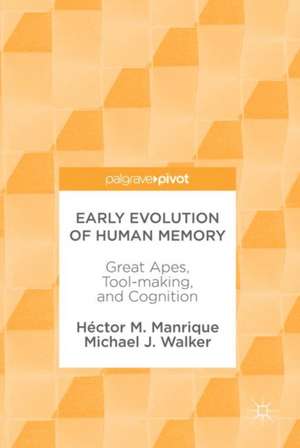Early Evolution of Human Memory: Great Apes, Tool-making, and Cognition
Autor Héctor M. Manrique, Michael J. Walkeren Limba Engleză Hardback – 8 sep 2017
| Toate formatele și edițiile | Preț | Express |
|---|---|---|
| Paperback (1) | 349.67 lei 38-44 zile | |
| Springer International Publishing – 11 aug 2018 | 349.67 lei 38-44 zile | |
| Hardback (1) | 421.72 lei 6-8 săpt. | |
| Springer International Publishing – 8 sep 2017 | 421.72 lei 6-8 săpt. |
Preț: 421.72 lei
Nou
Puncte Express: 633
Preț estimativ în valută:
80.70€ • 84.64$ • 67.18£
80.70€ • 84.64$ • 67.18£
Carte tipărită la comandă
Livrare economică 01-15 aprilie
Preluare comenzi: 021 569.72.76
Specificații
ISBN-13: 9783319644462
ISBN-10: 3319644467
Pagini: 150
Ilustrații: XV, 150 p. 10 illus.
Dimensiuni: 148 x 210 x 16 mm
Greutate: 0.43 kg
Ediția:1st ed. 2017
Editura: Springer International Publishing
Colecția Palgrave Macmillan
Locul publicării:Cham, Switzerland
ISBN-10: 3319644467
Pagini: 150
Ilustrații: XV, 150 p. 10 illus.
Dimensiuni: 148 x 210 x 16 mm
Greutate: 0.43 kg
Ediția:1st ed. 2017
Editura: Springer International Publishing
Colecția Palgrave Macmillan
Locul publicării:Cham, Switzerland
Cuprins
1. Tool-Use by Great Apes in the Wild.- 2. Great Apes, Tools, and Cognition.- 3. Early Tool-Making and the Evolution of Human Memory Systems in the Brain.- 4. Concluding Remarks.
Notă biografică
Michael J. Walker is Honorific Emeritus Professor in the Department of Zoology & Physical Anthropology at University of Murcia, Spain
Héctor M. Manrique is Assistant Professor in the Department of Psychology & Sociology at University of Zaragoza, Spain
Textul de pe ultima copertă
This work examines the cognitive capacity of great apes in order to better understand early man and the importance of memory in the evolutionary process. It synthesizes research from comparative cognition, neuroscience, primatology as well as lithic archaeology, reviewing findings on the cognitive ability of great apes to recognize the physical properties of an object and then determine the most effective way in which to manipulate it as a tool to achieve a specific goal. The authors argue that apes (Hominoidea) lack the human cognitive ability of imagining how to blend reality, which requires drawing on memory in order to envisage alternative future situations, and thereby modifying behavior determined by procedural memory. This book reviews neuroscientific findings on short-term working memory, long-term procedural memory, prospective memory, and imaginative forward thinking in relation to manual behavior. Since the manipulation of objects by Hominoidea in the wild (particularly in order to obtain food) is regarded as underlying the evolution of behavior in early Hominids, contrasts are highlighted between the former and the latter, especially the cognitive implications of ancient stone-tool preparation.
Caracteristici
Provides a critique of received wisdom through a multidisciplinary consideration of empirical experiments, neuroscientific findings, and archeological records Highlights the part played by the development of memory in the evolution of tool-making and tool-use by early humans, which it contrasts with the situation in great apes Addresses the matter with critical analysis rather than comfortable self-fulfilling accommodative argument Includes supplementary material: sn.pub/extras
